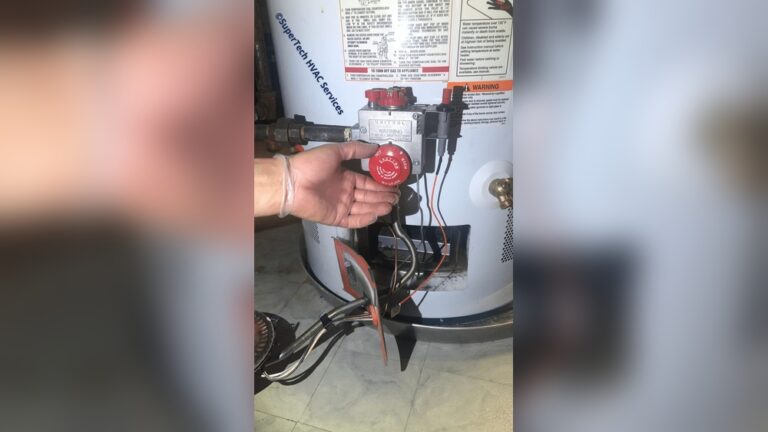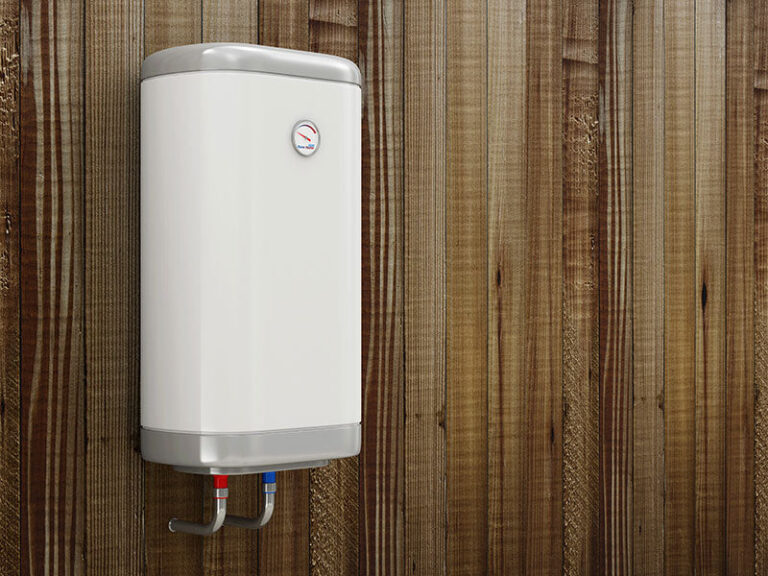Have you ever found yourself startled by the unsettling roar of your water heater, wondering if an aircraft is about to take off from your basement? If your water heater sounds more like a jet engine than a home appliance, you’re not alone.
This unusual noise can be both alarming and perplexing. You might be tempted to ignore it, hoping it will quiet down on its own. However, understanding the cause is crucial not only for your peace of mind but also for the longevity of your appliance.
We’ll dive into why your water heater is making such a racket and, more importantly, how you can silence it. Stick around to discover simple solutions that can transform your water heater from a noisy nuisance into a silent helper. Don’t let a roaring water heater disrupt your home; let’s tackle this head-on together.
Common Causes Of Loud Water Heaters
When a water heater roars like a jet engine, it’s alarming. Understanding the reasons behind such noise is essential for homeowners. Loud sounds often indicate underlying issues needing attention. Addressing these promptly can prevent further damage and ensure efficient functioning.
Sediment Buildup
Over time, minerals accumulate at the bottom of the tank. This sediment buildup causes rumbling or banging noises. Sediment acts as a barrier between the burner and water. It forces the heater to work harder, creating loud sounds. Regular flushing of the tank reduces sediment accumulation.
Loose Heating Elements
Heating elements can become loose due to wear and tear. These elements may vibrate and produce noise. Tightening or replacing them can solve the problem. It’s crucial to check these elements periodically. Ensuring they’re secure helps maintain quiet operation.
High Water Pressure
Excessive water pressure can lead to loud noises. It stresses the water heater, causing it to produce a roaring sound. Installing a pressure-reducing valve can help manage this issue. Regularly checking water pressure ensures it remains within safe limits.
Expanding And Contracting Pipes
Temperature changes cause pipes to expand and contract. This movement creates tapping or ticking sounds. Insulating pipes can minimize these noises. Proper installation and maintenance keep pipes stable. Stable pipes mean less noise and better performance.
Diagnosing The Source Of The Noise
Water heaters can sometimes make strange noises. If yours sounds like a jet engine, it can be alarming. Identifying the noise source is essential to prevent damage. Let’s explore how to diagnose these unusual sounds.
Listening For Specific Sounds
Start by paying close attention to the noise. Is it a rumble or a hiss? Each sound may indicate a different issue. Rattling sounds might mean loose components. Hissing could point to steam escaping. This initial assessment helps narrow down the problem.
Checking The Water Heater’s Components
Inspect the water heater’s parts. Look at the thermostat for any unusual signs. Examine the heating elements for wear and tear. Sometimes, sediment buildup causes loud noises. Clear any debris to see if the sound changes.
Inspecting The Pipes
Check the pipes connected to your water heater. Listen for vibrations or banging sounds. These noises often mean air is trapped inside. Ensure the pipes are secure and free from blockages. Pipe issues can lead to significant noise problems.
Fixing Sediment Buildup
Sediment buildup in a water heater can create loud noises, resembling a jet engine. Flushing the tank removes these deposits, restoring quiet operation and improving efficiency. Regular maintenance prevents future issues and extends the heater’s lifespan.
Fixing sediment buildup in your water heater can prevent it from sounding like a jet engine. When sediment accumulates, it can cause noise, reduce efficiency, and even damage the heater. Addressing this issue will help maintain your water heater’s performance and longevity. Discover simple methods to tackle sediment buildup effectively.Draining The Tank
Draining the tank removes the accumulated sediment. Start by turning off the power supply or gas. Allow the water to cool for safety. Connect a garden hose to the drain valve at the bottom. Direct the hose to a safe drainage area. Open the valve and let the water flow out. This step clears the sediment resting at the bottom.Flushing The System
Flushing the system eliminates remaining particles. After draining, close the drain valve. Turn on the water supply to refill the tank. Let the water run through for a few minutes. This process helps push out any lingering debris. Flushing ensures the tank is clean and ready for use.Using Water Softener Solutions
Water softener solutions can minimize future sediment buildup. Hard water contributes to sediment accumulation over time. Install a water softener to treat the incoming water. Softened water helps reduce mineral deposits. This preventive measure keeps your water heater quiet and efficient. Implementing these steps will safeguard your water heater’s performance.
Credit: www.reddit.com
Repairing Loose Heating Elements
A water heater that sounds like a jet engine might have loose heating elements. Tightening these elements can reduce noise. This simple repair ensures efficient heating and a quieter home environment.
Repairing loose heating elements in your water heater can fix that jet engine noise. This issue often arises from unsecured components. Loose heating elements cause vibrations and loud sounds. Address this problem with a few simple steps.Tightening The Elements
First, check the heating elements for looseness. Use a wrench to tighten any that are not secure. Ensure the power is off before you begin. This prevents accidents and ensures safety. Tightening can reduce noise significantly.Replacing Damaged Parts
Sometimes, tightening is not enough. Inspect the elements for visible damage. If damaged, replacement is necessary. Purchase new parts that fit your heater model. Carefully follow the instructions for installation. This ensures proper function and reduces noise.Managing High Water Pressure
High water pressure can cause your water heater to sound like a jet engine. This noise can be alarming. It often indicates a pressure issue in your plumbing system. Managing high water pressure is crucial. It prevents damage and extends your water heater’s life. Let’s explore how to manage it effectively.
Installing A Pressure Regulator
A pressure regulator can help manage high water pressure. It controls the flow of water into your home. This device is usually installed near the main water line. It reduces pressure to a safe level. Many homes already have one. But it might need replacing if it’s old or faulty.
Installing a pressure regulator is a simple task. A plumber can do it quickly. This small device can save you from costly repairs. It helps maintain consistent water pressure. Thus, protecting your water heater from damage.
Adjusting The Water Pressure
Once a pressure regulator is installed, adjust the water pressure. The ideal water pressure is between 40 and 60 PSI. You can check this with a pressure gauge. Attach it to an outdoor faucet to measure the pressure.
If the pressure is too high, adjust the regulator. Turn the screw on the regulator to lower the pressure. This adjustment is simple and can be done with a screwdriver. Regular checks ensure the pressure stays within a safe range.
Proper water pressure management prevents issues. It keeps your water heater running smoothly. Avoid the noisy disruptions that high pressure can cause.

Credit: www.youtube.com
Addressing Pipe Expansion Issues
Your water heater shouldn’t sound like it’s ready for takeoff. If it does, pipe expansion might be the culprit. As water heats up, pipes can expand and contract, causing a range of noises. Addressing these expansion issues can help quiet your system and keep it running smoothly. Let’s dive into two effective solutions: installing flexible connectors and insulating the pipes.
Installing Flexible Connectors
Flexible connectors can be a game-changer for noisy water heaters. These connectors accommodate movement in your pipes, reducing stress and noise. Imagine them as shock absorbers for your plumbing. They prevent pipes from knocking against walls or each other.
Installing these connectors is straightforward. You might need a wrench and some elbow grease. Ensure that they are the correct size for your pipes. This simple fix can drastically reduce the jet engine sound, making your home a quieter place.
Insulating The Pipes
Insulation is another effective method to tackle pipe expansion noise. It acts like a cozy blanket around your pipes, keeping them snug and sound-free. By maintaining a consistent temperature, insulation helps minimize expansion and contraction.
Consider using foam pipe insulation. It’s easy to install and available at most hardware stores. Simply cut it to size and wrap it around your pipes. This small investment can make a big difference in noise reduction.
Have you tried either of these solutions yet? They might just be the answer to your jet-engine woes. Take action today and enjoy the peace and quiet you deserve. After all, who wants a water heater that sounds like a plane?
When To Call A Professional
There comes a time when the sounds from your water heater go beyond a mere nuisance and transform into a worrying roar. If your water heater sounds like a jet engine, it’s crucial to know when to call a professional. Ignoring these sounds might lead to bigger problems, impacting your safety and the heater’s functionality. But how do you know it’s time to make that call? Let’s break down the signs and concerns.
Signs Of Severe Damage
Some sounds indicate severe damage. If your water heater is rumbling or banging, it could be due to sediment buildup. This sediment causes the heater to work harder and can lead to overheating or even bursting. If you notice leaking, this is a red flag. A leaking water heater means internal components are compromised. Strange smells or discolored water are also signs of damage. These issues can escalate quickly, requiring professional attention.
Safety Concerns
Your safety should be a top priority. A water heater making loud noises could indicate pressure build-up. This pressure might lead to dangerous scenarios, including explosions. Electrical issues can also be a factor, especially if the heater is making a buzzing noise. This could be a sign of faulty wiring or connections. Carbon monoxide leaks are another safety concern. If your heater uses gas, ensure there’s no odor resembling rotten eggs. This could signal a gas leak, which is hazardous. When your safety is at risk, don’t hesitate to call an expert.
Imagine waking up to what feels like an airport in your basement. That was me last winter. My water heater sounded like a jet engine. I didn’t understand the urgency until my plumber explained the risks. Do you want to wait for a disaster, or would you rather nip the problem in the bud?
By recognizing these signs and understanding the safety risks, you can prevent costly damages and ensure peace of mind. If your heater is sounding off alarms, don’t wait. Reach out to a professional and safeguard your home today.

Credit: waterheatersnow.com
Frequently Asked Questions
Why Does My Water Heater Sound Like An Airplane?
Your water heater might sound like an airplane due to sediment buildup or malfunctioning components. Sediment accumulation can cause rumbling or banging noises. Flushing the tank or checking parts like valves and thermostats can help. Regular maintenance ensures smooth operation and prevents unusual sounds.
Consider contacting a professional for a thorough inspection.
Why Does My Water Heater Sound Like A Car Engine?
Your water heater may sound like a car engine due to sediment buildup. This can cause rumbling noises. Flushing the tank regularly helps remove sediment. Also, check for loose components or faulty valves. If noises persist, consult a professional to inspect the heater for any underlying issues.
Why Does My Heater Sound Like A Jet Engine?
Your heater might sound like a jet engine due to a clogged filter, malfunctioning blower motor, or loose components. Regular maintenance and inspection can help identify and resolve these issues. Consider contacting a professional technician for a thorough check-up to ensure safe and efficient operation.
Should I Be Concerned About A Water Heater Making A Noise?
Yes, unusual water heater noises can indicate issues. Common causes include sediment buildup, pressure problems, or faulty components. Regular maintenance helps prevent noise. If the sound persists, consult a professional to diagnose and fix the problem, ensuring efficient operation and safety.
Conclusion
A noisy water heater can be unsettling. The jet engine sound often signals issues. Regular maintenance helps prevent these problems. Flushing the tank removes sediment buildup. Check for loose parts or faulty valves. Addressing these can restore peace. Don’t ignore strange noises for long.
They can lead to bigger issues. Consult a professional if unsure. Keeping your water heater in good shape ensures longevity. Enjoy quiet, reliable hot water. Stay proactive with your home maintenance. Your comfort depends on it.



